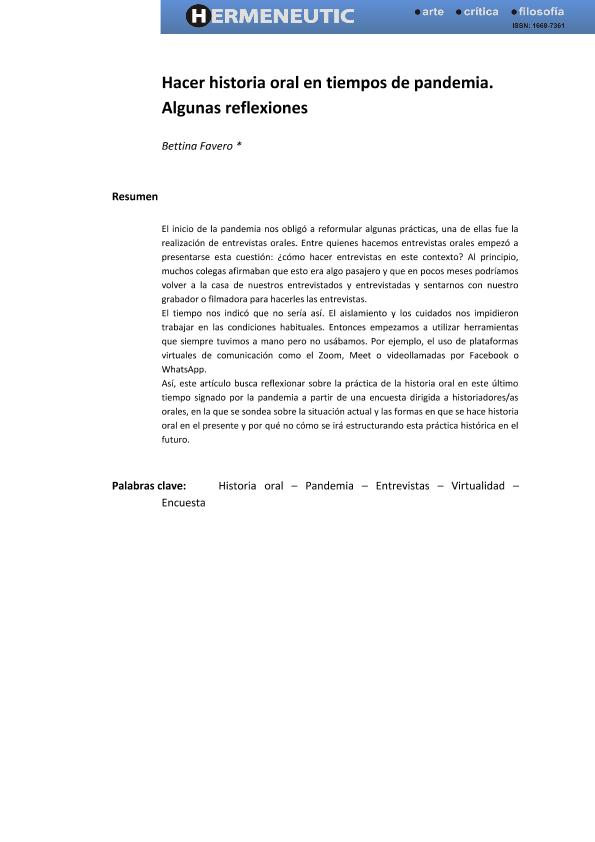Mostrar el registro sencillo del ítem
dc.contributor.author
Favero, Bettina

dc.date.available
2022-09-30T12:29:00Z
dc.date.issued
2021-12
dc.identifier.citation
Favero, Bettina; Hacer Historia Oral En Tiempos De Pandemia: Algunas Reflexiones; Universidad Nacional de la Patagonia Austral; Hermeneutic; 20; 12-2021; 41-47
dc.identifier.issn
1668-7361
dc.identifier.uri
http://hdl.handle.net/11336/171180
dc.description.abstract
El inicio de la pandemia nos obligó a reformular algunas prácticas, una de ellas fue la realización de entrevistas orales. Entre quienes hacemos entrevistas orales empezó a presentarse esta cuestión: ¿cómo hacer entrevistas en este contexto? Al principio, muchos colegas afirmaban que esto era algo pasajero y que en pocos meses podríamos volver a la casa de nuestros entrevistados y entrevistadas y sentarnos con nuestro grabador o filmadora para hacerles las entrevistas.El tiempo nos indicó que no sería así. El aislamiento y los cuidados nos impidieron trabajar en las condiciones habituales. Entonces empezamos a utilizar herramientas que siempre tuvimos a mano pero no usábamos. Por ejemplo, el uso de plataformas virtuales de comunicación como el Zoom, Meet o videollamadas por Facebook o WhatsApp.Así, este artículo busca reflexionar sobre la práctica de la historia oral en este último tiempo signado por la pandemia a partir de una encuesta dirigida a historiadores/as orales, en la que se sondea sobre la situación actual y las formas en que se hace historia oral en el presente y por qué no cómo se irá estructurando esta práctica histórica en el futuro.
dc.description.abstract
The onset of the pandemic forced us to reformulate some practices, one of which was conducting oral interviews. Among those who do oral interviews, this question began to arise: how to conduct interviews in this context? At first, many colleagues claimed that this was temporary and that in a few months we could return to the home of our interviewees and sit down with our tape recorder to do the interviews. Time told us that this would not be the case. Isolation and care prevented us from working under the usual conditions. So we started using tools that we always had on hand but didn't use. For example, the use of virtual communication platforms such as Zoom, Meet or video calls on Facebook or WhatsApp. Thus, this article seeks to reflect on the practice of oral history in recent times, marked by the pandemic, based on a survey directed at oral historians, in which the current situation and the ways in which history is made are surveyed and why not how this historical practice will be structured in the future.
dc.format
application/pdf
dc.language.iso
spa
dc.publisher
Universidad Nacional de la Patagonia Austral
dc.rights
info:eu-repo/semantics/openAccess
dc.rights.uri
https://creativecommons.org/licenses/by-nc-nd/2.5/ar/
dc.subject
HISTORIA ORAL
dc.subject
PANDEMIA
dc.subject
ENTREVISTAS
dc.subject
VIRTUALIDAD
dc.subject.classification
Otras Historia y Arqueología

dc.subject.classification
Historia y Arqueología

dc.subject.classification
HUMANIDADES

dc.title
Hacer Historia Oral En Tiempos De Pandemia: Algunas Reflexiones
dc.title
Oral history in times of pandemic: Some reflections
dc.type
info:eu-repo/semantics/article
dc.type
info:ar-repo/semantics/artículo
dc.type
info:eu-repo/semantics/publishedVersion
dc.date.updated
2022-09-23T10:05:57Z
dc.journal.number
20
dc.journal.pagination
41-47
dc.journal.pais
Argentina

dc.journal.ciudad
Rio Gallegos
dc.description.fil
Fil: Favero, Bettina. Consejo Nacional de Investigaciones Científicas y Técnicas. Centro Científico Tecnológico Conicet - Mar del Plata. Instituto de Humanidades y Ciencias Sociales. Universidad Nacional de Mar del Plata. Instituto de Humanidades y Ciencias Sociales; Argentina
dc.journal.title
Hermeneutic
dc.relation.alternativeid
info:eu-repo/semantics/altIdentifier/url/https://publicaciones.unpa.edu.ar/index.php/1/article/view/821
dc.relation.alternativeid
info:eu-repo/semantics/altIdentifier/doi/https://doi.org/10.22305/hermeneutic-unpa.n20.a2021.821
Archivos asociados
